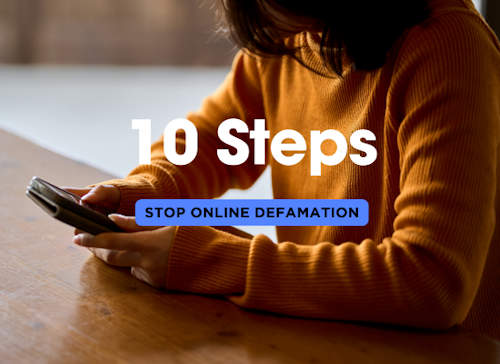Dealing with online defamation can be a daunting and emotionally draining experience. Whether it’s a false review, an inaccurate blog post, or damaging social media comments, online defamation has the power to harm your personal or business reputation in ways that can feel overwhelming. The internet’s vast reach means that once harmful content is published, it can spread quickly, affecting your credibility and causing lasting damage. However, with the right steps, you can regain control, protect your reputation, and minimize the impact. This guide walks you through 10 practical and actionable steps to resolve online defamation and rebuild your online presence—without escalating the situation.
1. Identify the Defamatory Content 🕵️♂️
Begin by locating the defamatory statements, whether it’s a post, comment, or article. You need to ensure the content meets the legal standard of defamation, which typically involves a false statement presented as a fact that harms your reputation. Document everything by taking screenshots, saving URLs, and noting the time and date of publication. This will serve as evidence if you decide to take legal action.
- How to Document: Use tools such as screenshot apps or web archivers like the Wayback Machine to ensure the content is preserved in its original form, even if it gets deleted later.
- What to Look For: Identify any content that falsely accuses you or your business of illegal actions, incompetence, or unethical behavior.
2. Assess the Impact 📊
Evaluate how the defamatory content affects your personal or business reputation. This includes understanding both the immediate damage (lost customers, declining business inquiries, personal distress) and the potential long-term effects (damage to future opportunities, ongoing harm to your reputation).
- Immediate Impact: Track any changes in web traffic, business performance, or social media mentions right after the defamatory content appears.
- Long-Term Impact: Consider if this content is likely to resurface later, such as when someone Googles your name or business, and whether it could affect job opportunities or business relationships.
- Emotional Impact: It’s important to also acknowledge the emotional toll defamation can take, and consider speaking to a professional for support during this process.
3. Contact the Platform or Website 📨
Once you’ve gathered evidence and assessed the impact, the next step is to contact the platform or website where the defamatory content is posted. Most platforms, including social media sites, have clear policies against defamatory content.
- How to File a Complaint: Use the platform’s reporting tools, typically found in the “Help” or “Contact Us” sections. Clearly explain why the content is defamatory, provide your evidence, and request its removal.
- Legal Support Option: If the platform doesn’t respond or refuses to remove the content, you may need to involve a lawyer to send a formal takedown notice.
- Response Time: Platforms often take time to review such requests, so patience is required, though some responses might come within 24-48 hours. Be prepared for back-and-forth communication.
4. Respond Calmly and Professionally 🤝
It can be tempting to react emotionally, but maintaining a calm and professional tone is crucial. Whether you decide to respond publicly or privately, focus on facts and correcting the false statements without further escalating the situation.
- Public Response: If you choose to respond publicly, address the issue directly by providing evidence that refutes the false claims, but avoid personal attacks or emotional language.
- Private Response: If possible, reach out to the individual who made the defamatory statement privately, requesting them to remove or retract it. This approach can sometimes resolve the issue quickly without drawing more attention.
- Things to Avoid: Avoid threats, aggressive language, or engaging in long debates online, as this can worsen the situation or draw more negative attention.
5. Seek Legal Advice ⚖️
If the defamatory content continues to cause harm or if the platform refuses to take action, it’s time to consult a legal professional who specializes in defamation cases. A lawyer can help determine whether you have a strong case for legal action and what your next steps should be.
- When to Involve a Lawyer: If the defamatory statements are damaging your business or personal reputation significantly, a lawyer can draft a cease-and-desist letter or prepare for more formal litigation.
- Options for Legal Recourse: Your lawyer can explore options like sending a cease-and-desist letter, filing a lawsuit, or taking other legal actions like seeking monetary compensation.
- Evidence Preparation: You will need to provide all documentation of the defamatory content, the impact it has had, and any correspondence with the platform or individual responsible.
6. Request a Retraction or Correction ✍️
In some cases, the person responsible for the defamatory statement may be willing to retract or correct the false information, especially if they didn’t realize the harm caused.
- How to Request a Retraction: Politely request the person or organization to publish a retraction or correction. Offer clear evidence that disproves their claims, and explain how this will help repair the damage caused.
- Public Retraction: If they agree, ask for a public retraction, ideally in the same format and platform where the defamatory content was initially published.
- Why It Matters: A retraction or correction can go a long way in restoring your reputation, as it publicly acknowledges the misinformation.
7. Monitor and Manage Your Online Reputation 🔍
Even after the defamatory content is removed or corrected, you need to continue monitoring your online presence to ensure that no further damaging content surfaces. Set up alerts and regularly check key platforms for mentions of your name or business.
- Set Up Google Alerts: Use tools like Google Alerts to get notifications when new content about you or your business is posted online.
- Social Media Monitoring: Use social media monitoring tools to track mentions and conversations that might include your name or brand.
- Reputation Management Services: In severe cases, consider hiring a reputation management firm to actively monitor and protect your online presence.
8. Boost Positive Content 📈
One effective way to counteract the impact of defamation is by creating and promoting positive content about yourself or your business. This helps push any negative content further down in search results, reducing its visibility.
- Create New Content: Publish blog posts, press releases, or testimonials that highlight your accomplishments, expertise, or positive feedback from clients.
- SEO Optimization: Optimize your website and social media profiles to rank higher in search engines for keywords related to your name or business, which helps push negative content lower in search results.
- Social Media Activity: Stay active on social media by posting valuable, relevant content that enhances your credibility and shifts the focus away from the defamatory content.
9. File a Defamation Lawsuit (If Necessary) 📝
If all other measures fail, and the defamatory content continues to harm your reputation, you may need to pursue a defamation lawsuit. This is usually a last resort, as legal action can be expensive and time-consuming.
- Preparing for Legal Action: Consult with a lawyer to determine if the defamation meets the legal threshold for a lawsuit, such as proving harm, falsity, and intent.
- Evidence for Court: Ensure you have all necessary evidence, including documentation of the defamatory content, its impact on your reputation, and any communication with the responsible parties.
- Potential Outcomes: If successful, you may be able to receive compensation for damages and have the defamatory content permanently removed.
10. Learn from the Experience and Stay Proactive 📚
After resolving the situation, take this opportunity to reflect and develop strategies to prevent future defamation incidents. Consider how you can protect your online reputation going forward and create a crisis management plan in case something similar happens again.
- Crisis Management Plan: Have a plan in place for how to quickly respond to any future defamatory content, including who to contact, steps to take, and how to handle the situation professionally.
- Continuous Monitoring: Keep monitoring your online presence, as prevention is the best way to manage defamation before it escalates.
- Stay Informed: Educate yourself on your legal rights regarding online defamation and how to address it effectively in the future.


